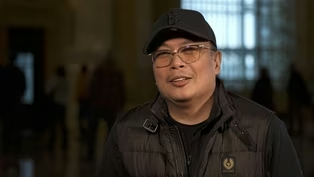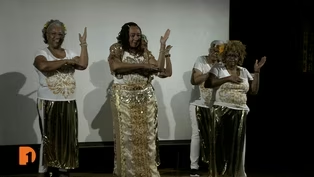
A Northville couple’s caregiving challenges are nearing the breaking point
Clip: Season 10 Episode 16 | 12m 8sVideo has Closed Captions
A couple is facing emotional, physical and financial challenges related to caregiving.
A study by AARP and the National Alliance for Caregiving estimates 63 million Americans are caregivers. One Detroit has the story of a Northville couple navigating the caregiving system. Linda Cline takes care of her husband, Randy, who was paralyzed after a bicycle accident. One Detroit’s Bill Kubota visited the Clines and talked with them about the issues and decisions they’re facing.
Problems playing video? | Closed Captioning Feedback
Problems playing video? | Closed Captioning Feedback
One Detroit is a local public television program presented by Detroit PBS

A Northville couple’s caregiving challenges are nearing the breaking point
Clip: Season 10 Episode 16 | 12m 8sVideo has Closed Captions
A study by AARP and the National Alliance for Caregiving estimates 63 million Americans are caregivers. One Detroit has the story of a Northville couple navigating the caregiving system. Linda Cline takes care of her husband, Randy, who was paralyzed after a bicycle accident. One Detroit’s Bill Kubota visited the Clines and talked with them about the issues and decisions they’re facing.
Problems playing video? | Closed Captioning Feedback
How to Watch One Detroit
One Detroit is available to stream on pbs.org and the free PBS App, available on iPhone, Apple TV, Android TV, Android smartphones, Amazon Fire TV, Amazon Fire Tablet, Roku, Samsung Smart TV, and Vizio.
Providing Support for PBS.org
Learn Moreabout PBS online sponsorship(upbeat music) - [Linda] We're just going through the motions every day.
We're not really living, we're just going through the motions every day.
- I watch her push the lawnmower.
Makes me want to cry, quite honestly.
- [Bill] Randy and Linda Cline, they're in Northville.
- Twice a day, she has to change my colostomy bag.
Every time I see her bend over to empty my urine bag, you know, that pinches my heart a little bit every time these things occur.
And she's wore out because she's doing what I used to do and taking care of me when the caregivers are not here.
- [Bill] Other caregivers are on the schedule to help Randy, but his wife Linda is the main one.
Linda, age 74, Randy, 69.
- You're trapped in that body sort of thing, I am.
Considering what I used to do.
- I can't imagine.
- I love playing guitar.
I love building them.
- [Bill] Randy had a band called Busted by Nine that ended for him in 2021 after a bicycle accident.
- I hit an orange barrel that I did not see.
I went over the handlebars.
The bike is fine, by the way, not a scratch on it, but I went right over the barrel and hit head first.
I had my helmet on and I skidded for a little away and I thought, "Oh, this is really gonna hurt," and I didn't feel anything and it was hard to breathe.
- Yeah, but now you're in pain 24/7.
- [Bill] Randy was a union electrician.
Linda worked in IT with a major bank.
They retired five years before the accident.
- Every day you were there, every day.
And that was during COVID.
We had that all mess to deal with.
And then my recovery was really slow in the beginning, but she would come see me every day.
And at that time, I could not feed myself.
I could only move a little bit of one hand and a foot.
- [Bill] A typical Tuesday breakfast time.
Linda's got the system down.
- He just had his pills.
Can't really get him up for a few minutes because of the blood pressure thing.
So I have to, you know, it's just easier to feed him.
And then I have to eat too, so it's just easier.
I've worked it out that way.
I don't mind the breakfast thing.
Caregivers don't get here till nine.
I don't want caregivers in the house right when I first get out of bed, I could have them do it.
Randy tells me to have them do it, but I don't just don't want people in the house.
That's so hard when you have people in your house all the time.
You know, you don't get any privacy, so I hate it.
I absolutely hate it, but there's nothing I can do.
I need the help.
- [Bill] And this is called a Hoyer lift?
It's Wednesday.
The visiting caregiver's running late.
Randy needs to get out of bed.
Linda operates the lift by herself.
- See, and it's broken, so I gotta, I'm trying to get it fixed, but is waiting for the doctor and insurance they tell me.
- Watch yourself.
- [Bill] Randy weighs over 200 pounds.
Wednesday is a shower day.
Getting him to the bathroom is a process.
This is covered by Medicare, right?
- Medicare covers the Hoyer and the wheelchair and the bed frame.
We bought the mattress.
So yeah.
- That was what, 3,000?
- Yeah, it was over three, yep, because we wanted a mattress that moved around.
So this is, how would I- - This is this little girl.
90 pound.
- Yeah, I'm losing weight some more.
- 96 pound.
- Did I get you right?
- Yep.
- The motorized wheelchair needs work too.
It's expensive and nearly five years old.
Linda spends a lot of time on the phone.
- If they would just repair it, I'd be happy with that.
But it's very hard to get anything repaired.
They're busy, I guess, you know, shorthanded probably, busy.
I don't know.
It's very, very difficult getting him over this bump, for me anyhow.
- [Bill] The Clines get advice from Carl Simcox.
He's with the Senior Care Network sorting out services for people like the Clines.
Simcox has been at it for 30 years.
- No one, if they have free time, is thinking about, what do I do if I need intense medical care?
They don't think about understanding what Medicare Medicaid is or how to make sure they don't become financially destitute.
Families aren't trained to provide that kind of level of care.
So it's really hard for them to do that.
And if family is doing it 24 hours a day, I can't tell you how many times I've seen caregiver burnout.
- I feel like I'm failing sometimes.
And emotionally, I take it out on him.
Physically, I take care of him perfectly, but emotionally, I'm a mess.
So I take it out on him.
I lose my temper, I lose my patience.
I don't feel like I'm cut out for this job.
- [Bill] One visiting caregiver, Kathy, she comes three mornings a week helping Randy with a stretching regimen which allows him to walk short distances with assistance.
Kathy is paid out of pocket, along with a few other caregivers who drop by here and there.
And the Clines get some help they don't have to pay for.
- Yeah, and this is from AgeWays.
Look at this.
I have to read through this.
- [Bill] AgeWays serving Southeastern Michigan provides caregivers two full days a week.
- It looks like I have to sign it.
- [Bill] What is that?
Hours or something?
- I have no idea.
I mean, look, I just got it today.
But on this book, I have everybody in here that's a caregiver, and I have every year they've been here, and how much I paid them.
Caregiving last year was $35,000 in cash.
- [Bill] This is out of pocket, then?
- Out of pocket, and caregiving here, I spent 30, does that say 36?
Yeah, 36.
I don't know sometimes, I don't know.
You know, I get worried because, you know, it's everything that we worked our lives for.
I worked all my life to be here, and here it goes all to caregiving and medical bills.
So I don't know where I'd be if we owed money, you know, for car payments and house payments.
So, yeah.
- [Bill] The Clines used to spend time in Florida, had a second home there, but that was sold so they could redo their Northville house to make it wheelchair-friendly.
- Right here?
- Yep.
- [Bill] Lunchtime.
With the visiting caregiver on duty with Randy, Linda can leave the house.
She usually gets some short daytime interludes to do yoga, play pickleball, and get some shopping done.
Another Monday afternoon.
- Do you wanna leave it like that?
- I'll leave it like that.
- [Bill] Another caregiver takes Randy to physical therapy paid for by Medicare.
That happens twice a week.
- [Doctor] One, two, and up.
Up up up up up, good.
- We're managing financially because of me, because I do a majority of the caregiving and the rest of it is covered by our pension checks and our social security.
- Lined up?
- You're perfect.
- [Bill] Generally speaking, it's more cost-effective if people like Randy can live at home and be cared for there.
- Right there, is you a good dog?
- [Bill] But as Linda gets older and needs more help, the question arises.
- [Linda] You know, why don't you bring in more caregivers?
And so he doesn't have to go into a home, but, you know.
- It's a money thing.
- Well, and plus, you know, sometimes they don't show up.
It's like, and so it's all on me if they don't show up, so people don't understand.
And then I said, if I have caregivers in this house round the clock, except for when he's sleeping, where am I gonna go?
It's a small house.
I mean, I'm thankful for it, but I have to go sit in the basement.
I don't know what I would do with myself because I can't go spending money.
I can't, you know, I can't, it's like I'm so limited on what I can do.
- [Bill] Support from Medicare, not Medicaid, has been good, the Clines say, but Medicare only goes so far.
- Most people think that Medicare covers more than it really does.
Medicare is designed to help in the acute stage, whether it's the hospitalization, short-term rehabilitation in a skilled nursing setting, - [Caregiver] Two, three.
- [Carl] It doesn't cover the custodial care of caring for somebody, which is very intense.
- [Bill] Much of Randy's care falls in the custodial category, based on their finances, the Clines see a Medicaid nursing home in their future, but they'll have to spend down their savings to qualify.
- So Medicaid is designed for people who have no financial resources.
So you have to meet a certain income requirement as well as a certain medical need.
But you have to have less than $2,000 in savings.
So you have to spend your money and then apply for Medicaid.
And that's primarily in a nursing home.
- But he doesn't wanna go into a home, so.
- When you're ready, I'll go.
- I mean, we're trying to hold off, I don't know.
I'm just, but I'm start, like right now, I have a pain in my leg.
I know it's stress because I don't know how to, I don't know how to let go of things either.
If I see something that needs, I think we're the generation that if I see something that needs to be done, I do it, whether it's taking a toll on me or not.
- [Bill] What's next?
Perhaps when Randy has another hospital visit, like when he had pneumonia a few months ago, the Clines might be able to make a move.
- You have to have three days in a hospital before they'll transfer you to a- - If you go three days in a hospital, you can then get like six weeks of inpatient rehab.
And so Carl, who is my advisor on this, he said, don't just go into a nursing home and, you know, they're gonna know you're gonna go on Medicaid.
He said to get the better nursing home, go into the hospital for three days, and then you can go into a nursing home, then start paying cash and then go on Medicaid.
But it's something you don't tell anybody going in.
- [Bill] Linda said a nursing home they'd want costs $15,000 a month, but also has to accept Medicaid.
There, they'd spend out of pocket until Randy's assets are depleted.
But then how many months can you afford 15,000 a month?
- We only have maybe five, five months.
He's got an OT guy coming at 3:00 today.
Mentally, I'm starting to talk to someone, a therapist, and see if that helps, you know, my mental state.
I mean this is not a life, but I got a dog and I have a son, otherwise I wouldn't be here, truthfully.
Sorry, Randy.
Video has Closed Captions
Clip: S10 Ep16 | 1m 25s | Detroit resident John Galvan participates in One Detroit’s “Destination Detroit” series. (1m 25s)
Divine Divas dance troupe perform at St. Patrick Senior Center
Video has Closed Captions
Clip: S10 Ep16 | 1m 22s | A performance featuring the Divine Divas dance troupe at St. Patrick Senior Center. (1m 22s)
Local agency leaders discuss the needs of older adults and their caregivers
Video has Closed Captions
Clip: S10 Ep16 | 7m 31s | The “Caring for Caregivers” event featured important conversations on helping older adults age well. (7m 31s)
Providing Support for PBS.org
Learn Moreabout PBS online sponsorship
- News and Public Affairs

Top journalists deliver compelling original analysis of the hour's headlines.

- News and Public Affairs

FRONTLINE is investigative journalism that questions, explains and changes our world.












Support for PBS provided by:
One Detroit is a local public television program presented by Detroit PBS


